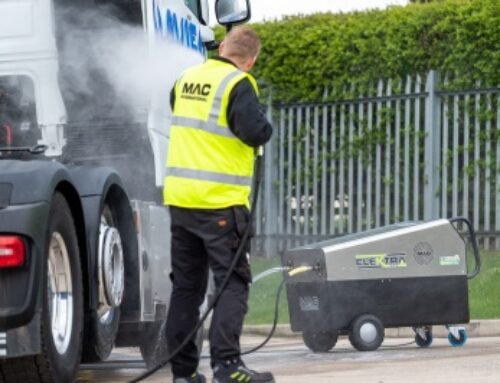TotalEnergies: don’t forget the lubricants
 Oils supplier TotalEnergies Marketing UK has emphasised the role played by lubricants in controlling both fuel costs and emissions for commercial vehicle fleets.
Oils supplier TotalEnergies Marketing UK has emphasised the role played by lubricants in controlling both fuel costs and emissions for commercial vehicle fleets.
“Taken together, the dual factors of climate and cost crisis mean more attention than ever is being paid to the issue of fuel efficiency and how best to achieve it,” said Tom Hyde, technical manager at TotalEnergies Marketing UK (pictured, right).
“More specifically, how do you get more distance, less wear-and-tear, less maintenance and less emissions across the entire, highly complex engineering ecosystem within these vehicles?
“There is no panacea and it is important to look across the whole lifecycle of vehicle and its component parts. For example, enhancing the long-term durability of a machine may in some cases provide greater carbon savings than replacing wholesale with emerging technologies.
“Key here is the role of lubricants, which can make a substantial, tangible difference in terms of both meeting environmental considerations and helping to counter rising fuel costs.”
Driving better performance out of engine oils and lubricants through innovation is not only the domain of high-performance racing, contends Tom.
“Significant achievements have been made over the past few years, with products now on the market – including our own Rubia TIR 9900 5W-30 – which increase uptime and lower maintenance costs,” he continued.
“These efficiency gains are being realised often through reduced friction and viscosity of lubricants, equating to between two per cent and three per cent increases in fuel efficiency for commercial vehicles.
“At the scale we are talking about, that’s a significant amount of money saved. Globally, nearly a third of the engine oils we sell worldwide are formulated specifically for fuel-efficiency – and that’s only going to grow.”
Another way that fuel efficiency can be bolstered is through testing and diagnostic systems and programmes for oils and lubricants, Tom adds.
“Traditionally, the main focus was whether the oil was ‘still OK’. Now the range of diagnostics is more robust, measuring in minute detail the presence of wear elements and contaminants, and providing a clearer picture than ever before about the health and lifespan of the lubricant and parts,” he said.
“The result is a reduction in the cost per working hours or per kilometre of any commercial vehicle or fleet, and extended life for both materials and equipment. That can make for major savings when it comes to maintenance and operational costs, along with less waste and more fuel efficiency.”
The final step in the chain is the disposal and recycling of oils and lubricants – an often overlooked area when it comes to helping with fuel efficiency and environmental impact, says Tom.
“Waste recycling providers across the UK such as Slicker take used oil – traditionally disposed through fuel burning in the marine or energy markets – and reprocess it into a base oil product to create new carbon-efficient lubricating oils,” he said.
“Overall, this emits about 30 per cent less CO2 than lubricants produced from crude oil.”










